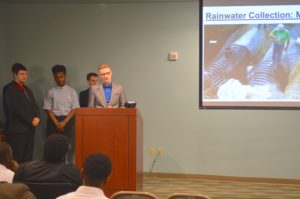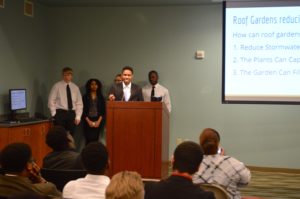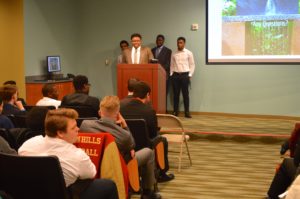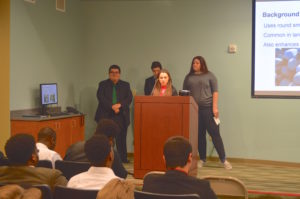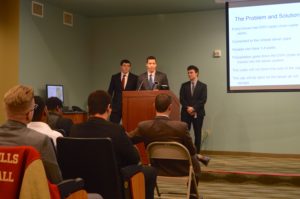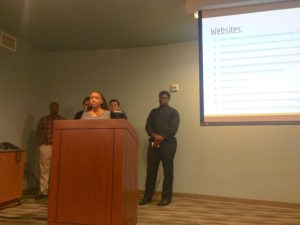Students recommend remedies for stormwater runoff
Teams from Penn Hills and South Fayette school districts presented findings and recommendations last week after ALCOSAN (Allegheny County Sanitary Authority) tasked them with identifying ways to reduce storm water runoff on the campuses of their respective schools.
They took up the challenge as part of our Student Powered Solutions program, which pairs classrooms with companies or community organizations to create Project-Based Learning (PBL) experiences. ALCOSAN’s Scholastic Outreach program provided the consulting assignment when ALCOSAN engineer Julia Spicher backgrounded the students on the reasons the authority needs to promote better storm water management.
The teams devised numerous approaches to the problem after researching options and reviewing them with Nancy Lonnett Roman, a landscape architect with Pashek Associates and David Esposito, an architect with Eckles Architecture & Engineering, who volunteered professional guidance.
Among others, the Penn Hills team came up with the idea of putting a drainage and recovery system at the base of a hillside from which water flows onto their athletic field during storms. They proposed channeling the water to a pump that would recycle it to a school garden.
Among ideas South Fayette’s team recommended was a cap for the residential roof plumbing stack vents that prevent sewer gases from entering homes. They designed and made a cylindrical prototype with open sides for gases to escape and a conical top to keep rainwater from entering the sewage system during storms.
Both district teams also determined that roof gardens would help reduce runoff and conserve energy. They noted that roof gardens can absorb as much as 60% of the water that normally flows off roofs during storms and reduce air conditioning needs when the water evaporates from the planting medium.
Project Based Learning has been gaining advocates in education because it provides opportunities for students to apply classroom lessons. Projects can make abstract concepts more tangible and help motivate kids because they demonstrate the relevance of their academic learning.
Because Project-Based Learning usually is conducted in teams, the students also have opportunities to build soft skills that they’ll need in the workplace—from communications, collaboration, creativity and critical thinking, to organization, planning and presentation. Research shows these skills can be as important to future success as academic achievement.
One Penn Hills student said the ALCOSAN project was an opportunity to “change how we’re learning.” Two teachers involved also said they found the experience changed the way they normally teach and helped them grow as educators.
